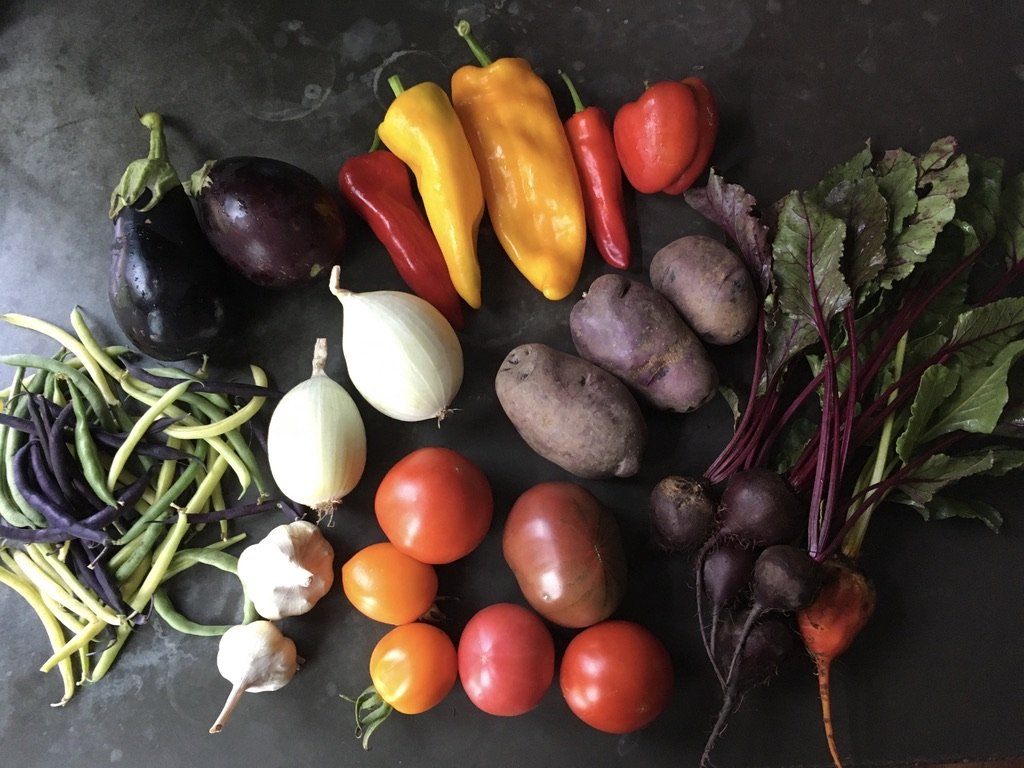September 1st, 2020
What’s in your share?
Italian Eggplant
Blue Adirondack Potatoes
Beans
Beets or Radishes
Chopaka Softneck Garlic
Sweet Peppers
Heirloom Tomatoes
White Sweet Spanish Onions
We recently had one of our members ask us a question that inspired this newsletter. The question was, “I wonder if it would be possible/feasible for you to have a produce exchange with other local-ish farmers, i.e. doing something such that bitter melon, Thai basil, or African eggplant shows up in our shares too? Might be a cool way to exchange with diverse producers and diverse produce.” This is a great question, and I want to answer it for all of our members, because I have a feeling that others may have similar inquiries. There are really two questions here, 1) Is there a way to get more diversity/more adventurous veggies in our shares?, and 2) Is this possible through working with other local farms who grow crops we do not?
In regards to the diversity in the shares, it is an area that we are very cautiously navigating. As a new farm in a part of town we haven’t lived in for long, we are attempting to humbly enter our community, asking and observing what it is that our community wants and needs to eat. Deciding to join a CSA is an immense commitment, and frankly, we were shocked when our member list filled up so quickly in only our second CSA season. It means so much that all of you decided to embark upon this journey with us, most of you returning after our first CSA season. For our first couple seasons, we opted to supply the staples; things most folks are familiar with and know how to make basic dishes with. It’s no small task to use up the entire share before the next one comes, and we realize this. This is why we didn’t want to put too many unfamiliar veggies in your shares (radicchio anyone?). However, we’re learning that we have tons of creative cooks among our members, and we hope that as we evolve and the farmer/member relationships grows, we can provide some variety that our members want. More than anything, we believe it is a human right to have access to nourishing food, and we hate that we have to sell it. Coming up with $600 in one or two chunks is certainly an obstacle to joining a CSA, and we wanted to avoid the additional obstacle of learning to cook with obscure veggies for our first couple years. That being said, we love an opportunity to learn and experiment, so we are always totally open to suggestions!
As for working with other farms in the area, we are grateful to have been so warmly welcomed into the farming community. From other vegetable growers, to dairy farmers, and livestock farmers, the amount of encouragement and selfless advice we have gotten cannot be quantified. Most of the time it seems like we’re the whippersnappers of the farming community (and we are; we have TONS to learn). We have heard from our elders how hard a life of farming can be. Financially and physically, it’s taxing. Most people who are privileged enough to choose a life of farming choose it as an alternative to a different grind; a way to live with purpose, to reconnect with the out-of-doors, to be their own boss, etc. But what they find is that it’s more than a full time job that demands constant emotional and physical attention. The self sufficient life is appealing, but it’s also misleading. We’re learning that it may be in all the farmers’ best interest to have more communication, organization, and delegation when it comes to feeding our community. Some land is better for growing certain crops than others. Some farmers have tools and equipment that make harvesting go a lot faster. As we’re learning in our co-housing community at home, things get a lot easier when work is distributed and shared among a larger group. How our farm relates to other farms is still unknown, but we hope that the network of farmers in southeastern Wisconsin continues to grow and strengthen. As we evolve, it is important to be realistic about what our land and our own bodies can handle, while always maintaining a collaborative commitment to our farmer community.
